| Pages:
1
..
4
5
6
7
8
..
14 |
Abromination
Hazard to Others
  
Posts: 432
Registered: 10-7-2018
Location: Alaska
Member Is Offline
Mood: 1,4 tar
|
|
My experiment using boric acid and calcium chloride to catalyze a Fischer esterification is going quite well. The reflux time has taken quite a while
but the smell of ethyl salicylate is strong now and a spot test leaves an oily, wintergreen residue. Boric acid alone was unsuccessful, but with the
dry calcium chloride things are looking good.
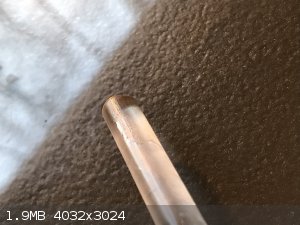 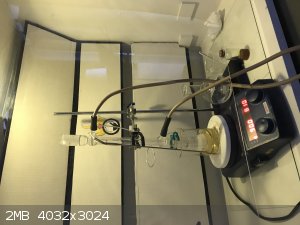
List of materials made by ScienceMadness.org users:
https://docs.google.com/spreadsheets/d/1nmJ8uq-h4IkXPxD5svnT...
--------------------------------
Elements Collected: H, Li, B, C, N, O, Mg, Al, Si, P, S, Fe, Ni, Cu, Zn, Ag, I, Au, Pb, Bi, Am
Last Acquired: B
Next: Na
-------------- |
|
|
Tsjerk
International Hazard
    
Posts: 3032
Registered: 20-4-2005
Location: Netherlands
Member Is Offline
Mood: Mood
|
|
Nice synth! I just saw the monohydrate of CaCl2 only loses water at 260 degrees and the dihydrate at 175... That is interesting... I guess that could
be used for other esterfications.
|
|
|
Abromination
Hazard to Others
  
Posts: 432
Registered: 10-7-2018
Location: Alaska
Member Is Offline
Mood: 1,4 tar
|
|
The idea was to remove water from the reaction. Reports of boric acid catalysed esterification have been floating around for a while, and after
limited success with that alone I figured the drying agent would help. Seems to work!
List of materials made by ScienceMadness.org users:
https://docs.google.com/spreadsheets/d/1nmJ8uq-h4IkXPxD5svnT...
--------------------------------
Elements Collected: H, Li, B, C, N, O, Mg, Al, Si, P, S, Fe, Ni, Cu, Zn, Ag, I, Au, Pb, Bi, Am
Last Acquired: B
Next: Na
-------------- |
|
|
j_sum1
Administrator
       
Posts: 6333
Registered: 4-10-2014
Location: At home
Member Is Offline
Mood: Most of the ducks are in a row
|
|
Today I prepared a buffer solution to pH 7.4 on a 4400 litre scale.
The pool is full of fresh clean water and looks great.
|
|
|
AvBaeyer
National Hazard
   
Posts: 651
Registered: 25-2-2014
Location: CA
Member Is Offline
Mood: No Mood
|
|
Abromination:
Your esterification experiment is interesting but I believe demands a bit more rigor before you can conclude that the CaCl2/B(OH)3 combination is an
esterification catalyst. The long reaction time that your post implies raises the possibility that you are simply reaching an equilibrium between
salicyclic acid and its ester. Salicylic acid is a strong enough acid to catalyze its own partial esterification (pKa = 2.98) given enough time and
high enough temperature. I suggest that this may be what you are seeing that is giving you your product. Also keep in mind that CaCl2 is not a good
water scavenger in alcohol solvents as the alcohol can compete with water for coordination sites on calcium, especially when a large excess of alcohol
is present relative to the water produced. Following the scientific method, I suggest the experiments outlined below:
1. React salicylic acid and ethanol without any catalyst under the exact same conditions you are using in the experiment you described (molar ratios,
time, temperature). Compare ester production versus your current experiment as best you can.
2. Repeat (1) using boric acid as a catalyst alone. It appears that you have tried this but you need to do it as in (1) above.
3. Repeat (1) using CaCl2 alone.
I hazard a guess that experiments 1, 2,and 3 will give results the same as your current observation. These kinds of things make chemistry interesting
and can lead to new discoveries.
AvB
|
|
|
Tsjerk
International Hazard
    
Posts: 3032
Registered: 20-4-2005
Location: Netherlands
Member Is Offline
Mood: Mood
|
|
Does anyone have data about the temperature where CaCl2 starts to lose methanol / ethanol as adduct? This is interesting because if that temperature
is below the boiling point of the given alcohol, it should work as a catalyst with a minimal amount of acid.
|
|
|
Abromination
Hazard to Others
  
Posts: 432
Registered: 10-7-2018
Location: Alaska
Member Is Offline
Mood: 1,4 tar
|
|
Quote: Originally posted by AvBaeyer  | Abromination:
Your esterification experiment is interesting but I believe demands a bit more rigor before you can conclude that the CaCl2/B(OH)3 combination is an
esterification catalyst. The long reaction time that your post implies raises the possibility that you are simply reaching an equilibrium between
salicyclic acid and its ester. Salicylic acid is a strong enough acid to catalyze its own partial esterification (pKa = 2.98) given enough time and
high enough temperature. I suggest that this may be what you are seeing that is giving you your product. Also keep in mind that CaCl2 is not a good
water scavenger in alcohol solvents as the alcohol can compete with water for coordination sites on calcium, especially when a large excess of alcohol
is present relative to the water produced. Following the scientific method, I suggest the experiments outlined below:
1. React salicylic acid and ethanol without any catalyst under the exact same conditions you are using in the experiment you described (molar ratios,
time, temperature). Compare ester production versus your current experiment as best you can.
2. Repeat (1) using boric acid as a catalyst alone. It appears that you have tried this but you need to do it as in (1) above.
3. Repeat (1) using CaCl2 alone.
I hazard a guess that experiments 1, 2,and 3 will give results the same as your current observation. These kinds of things make chemistry interesting
and can lead to new discoveries.
AvB |
Just now saw your post, so sorry for posting twice.
Boric acid was tried before under the same conditions. This resulted in the smell but negative results with a spot test.
My next step was already to try calcium chloride alone as well as just the acid and alcohol for a control. I am aware of the slight reaction between
the two.
The point of the experiment is to try different reagents as a catalyst, so failure does not upset me. When each method has been attempted, I will
repeat each of them again in the same conditions to stay true to the scientific method and isolate as many variables as possible. For right now its
more of a matter of feasibility and curiosity.
List of materials made by ScienceMadness.org users:
https://docs.google.com/spreadsheets/d/1nmJ8uq-h4IkXPxD5svnT...
--------------------------------
Elements Collected: H, Li, B, C, N, O, Mg, Al, Si, P, S, Fe, Ni, Cu, Zn, Ag, I, Au, Pb, Bi, Am
Last Acquired: B
Next: Na
-------------- |
|
|
SWIM
National Hazard
   
Posts: 970
Registered: 3-9-2017
Member Is Offline
|
|
Aren't you worried about the boric acid forming esters with the alcohol?
This would both tie up your acid and add water to the reaction mixture.
You might deal with the water generated by using metaboric acid or boron trioxide mixed in with your boric acid ( edit:Or the CaCl you did use), but
it might make the ethyl borate formation worse.
That's the thing: You want to soak up the water to drive the reaction but boric acid + alcohol makes water, and drying up that water also drives that
equilibrium to the right as well as the equilibrium of the reaction you want.
If I'm totally wrong about boric acid forming esters in such conditions just ignore this.
[Edited on 17-2-2020 by SWIM]
|
|
|
Abromination
Hazard to Others
  
Posts: 432
Registered: 10-7-2018
Location: Alaska
Member Is Offline
Mood: 1,4 tar
|
|
Quote: Originally posted by SWIM  | Aren't you worried about the boric acid forming esters with the alcohol?
This would both tie up your acid and add water to the reaction mixture.
You might deal with the water generated by using metaboric acid or boron trioxide mixed in with your boric acid ( edit:Or the CaCl you did use), but
it might make the ethyl borate formation worse.
That's the thing: You want to soak up the water to drive the reaction but boric acid + alcohol makes water, and drying up that water also drives that
equilibrium to the right as well as the equilibrium of the reaction you want.
If I'm totally wrong about boric acid forming esters in such conditions just ignore this.
[Edited on 17-2-2020 by SWIM] |
I’m sure its possible in some quantity, but I beleive such a reaction requires a decent amount of a very strong dehydrating agent such as sulfuric
acid or phosphorus pentoxide to occur. It is a factor that could also lower yield. The idea with the calcium chloride was to remove water from the
reaction without taking place in the reaction itself to drive it right, but I am questioning its effectiveness in an alcoholic environment.
As stated before, this is not to find a better way to do an esterification, it is merely a project for my own curiosity and for fun. Its not
particularly costly or time consuming, either.
List of materials made by ScienceMadness.org users:
https://docs.google.com/spreadsheets/d/1nmJ8uq-h4IkXPxD5svnT...
--------------------------------
Elements Collected: H, Li, B, C, N, O, Mg, Al, Si, P, S, Fe, Ni, Cu, Zn, Ag, I, Au, Pb, Bi, Am
Last Acquired: B
Next: Na
-------------- |
|
|
mayko
International Hazard
    
Posts: 1218
Registered: 17-1-2013
Location: Carrboro, NC
Member Is Offline
Mood: anomalous (Euclid class)
|
|
As I was wrapping up the ammonia project, I ran across something in Merck that I hadn't heard before... apparently concentrated ammonia dissolves
copper metal? I scrubbed a bit of copper wire until it was shiny and put it in a corked test tube with a couple mL of concentrated ammonia. Sure
enough, over a couple of days it turned the dark blue of an ammonia-copper complex!
al-khemie is not a terrorist organization
"Chemicals, chemicals... I need chemicals!" - George Hayduke
"Wubbalubba dub-dub!" - Rick Sanchez
|
|
|
woelen
Super Administrator
        
Posts: 8027
Registered: 20-8-2005
Location: Netherlands
Member Is Offline
Mood: interested
|
|
Concentrated ammonia only dissolves copper if also oxygen is present. The oxygen oxidizes the copper and the ammonia makes it possible for the copper
to dissolve as the [Cu(NH3)4](2+) complex. Your solution turns strongly basic, the oxide ends up as hydroxide ion.
This effect actually is quite common. If a suitable coordinating agent is present in solution, then many metals can be oxidized much more easily than
without the coordinating agent. Best example is the solubility of gold in a solution of KCN through which air is passed. A very nice example in the
home lab is the dissolving of copper in dilute acid (e.g. 10% HCl) to which some thiourea is added. The copper then dissolves, with formation of
hydrogen! Without the thiourea, copper does not dissolve in non-oxidizing dilute acid.
|
|
|
Bedlasky
International Hazard
    
Posts: 1241
Registered: 15-4-2019
Location: Period 5, group 6
Member Is Offline
Mood: Volatile
|
|
That's really interesting! I have some silver cleaner containing thiourea, so I definitely try it.
|
|
|
fusso
International Hazard
    
Posts: 1922
Registered: 23-6-2017
Location: 4 ∥ universes ahead of you
Member Is Offline
|
|
So that means thiourea reverse the redox potentials for the rxn?
|
|
|
woelen
Super Administrator
        
Posts: 8027
Registered: 20-8-2005
Location: Netherlands
Member Is Offline
Mood: interested
|
|
The thiourea does not reverse any potentials, it shifts redox potentials. In general, nearly all coordinating agents shift redox potentials, but some
compounds have a strong effect, while others have less effect.
In the example of thiourea and copper, the redox potential of the reaction from metallic copper to copper(I) is shifted, such that it goes below the
reaction from H2 to H(+) ion. Copper is somewhat noble, but not much so, and it is shifted to the range, where metals can dissolve in non-oxidizing
acids with production of H2. The copper itself in this reaction then forms a thiourea-complex of copper(I).
|
|
|
Medyc
Harmless

Posts: 7
Registered: 8-3-2017
Member Is Offline
Mood: No Mood
|
|
I know we've moved past the boric acid catalyzed esterification, but i do have experience with this.
DOI: 10.1021/ol036123g
I have used this method to prepare the alpha hydroxy ester of threonine. Good yields, and largely chemoselective between acids.
[Edited on 28-2-2020 by Medyc]
|
|
|
mayko
International Hazard
    
Posts: 1218
Registered: 17-1-2013
Location: Carrboro, NC
Member Is Offline
Mood: anomalous (Euclid class)
|
|
Stores are still largely empty of cleaning supplies here! I had a bucket of calcium hypochlorite granules in the shed so I set about converting it
into chlorine bleach with sodium carbonate. Filtering the calcium carbonate was the hardest part - it is very fine and the concentrated bleach quickly
destroys paper and cotton!  Next time I might try to set up a large scale
vacuum filtration system. Next time I might try to set up a large scale
vacuum filtration system.
I measured concentration by density and wound up with 5.5 gallons of ~6% bleach. I think I could do it more efficiently next time. This was way more
than I needed so I donated some to the local makerspace (which is staying open making face shields) and the rest to a mutual aid group for
distribution 
al-khemie is not a terrorist organization
"Chemicals, chemicals... I need chemicals!" - George Hayduke
"Wubbalubba dub-dub!" - Rick Sanchez
|
|
|
arkoma
Redneck Overlord
      
Posts: 1763
Registered: 3-2-2014
Location: On a Big Blue Marble hurtling through space
Member Is Offline
Mood: украї́нська
|
|
Got a 1943 Mercury dime the other evening and promptly set it to soak in 68% HNO3. A 1968 Canadian nickel also.
The silver solution has a slight blue cast from the 10% Cu, and the nickel solution is a lovely green.
"We believe the knowledge and cultural heritage of mankind should be accessible to all people around the world, regardless of their wealth, social
status, nationality, citizenship, etc" z-lib
|
|
|
wg48temp9
National Hazard
   
Posts: 786
Registered: 30-12-2018
Location: not so United Kingdom
Member Is Offline
|
|
Quote: Originally posted by Medyc  | I know we've moved past the boric acid catalyzed esterification, but i do have experience with this.
DOI: 10.1021/ol036123g
I have used this method to prepare the alpha hydroxy ester of threonine. Good yields, and largely chemoselective between acids.
|
Interesting paper thanks. It mentions a 1971 paper claiming it was the first paper suggesting the use of boric acid for esterification but only for
phenol esters. The paper is attached below
Attachment: boric-acid-lawrence1971.pdf (69kB)
This file has been downloaded 416 times
I am wg48 but not on my usual pc hence the temp handle.
Thank goodness for Fleming and the fungi.
Old codger' lives matters, wear a mask and help save them.
Be aware of demagoguery, keep your frontal lobes fully engaged.
I don't know who invented mRNA vaccines but they should get a fancy medal and I hope they made a shed load of money from it.
|
|
|
fusso
International Hazard
    
Posts: 1922
Registered: 23-6-2017
Location: 4 ∥ universes ahead of you
Member Is Offline
|
|
Quote: Originally posted by arkoma  | | Got a 1943 Mercury dime the other evening and promptly set it to soak in 68% HNO3. A 1968 Canadian nickel also. |
Such a waste arkoma, shouldve save a few more for bulk rxn to save reagents
|
|
|
arkoma
Redneck Overlord
      
Posts: 1763
Registered: 3-2-2014
Location: On a Big Blue Marble hurtling through space
Member Is Offline
Mood: украї́нська
|
|
Nah. I've spent $100 making something I could buy for $3 Only other silver i have is a Kookaburra from Oz, and AIN'T using it.
*edit* the HNO3 was home sourced also.
*edit* Some diethyl ether
[Edited on 4-11-2020 by arkoma]
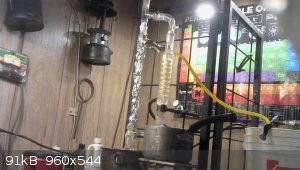
[Edited on 4-11-2020 by arkoma]
"We believe the knowledge and cultural heritage of mankind should be accessible to all people around the world, regardless of their wealth, social
status, nationality, citizenship, etc" z-lib
|
|
|
mayko
International Hazard
    
Posts: 1218
Registered: 17-1-2013
Location: Carrboro, NC
Member Is Offline
Mood: anomalous (Euclid class)
|
|
I've been experimenting with using the paper straws that are popular these days as casings for DIY fireworks. I've had a few successes, but I think
the best part so far has been lighting Zn/S at night and shining the shortwave UV Tdep gave me through the plume of phosphorescent smoke. It's like
incense smoke in a sunbeam, except it's ghostly green and everything is dark. It doesn't show up well on my camera, unfortunately
al-khemie is not a terrorist organization
"Chemicals, chemicals... I need chemicals!" - George Hayduke
"Wubbalubba dub-dub!" - Rick Sanchez
|
|
|
Abromination
Hazard to Others
  
Posts: 432
Registered: 10-7-2018
Location: Alaska
Member Is Offline
Mood: 1,4 tar
|
|
Ran some sulfur dioxide through concentrated hydrogen peroxide to restock my sulfuric acid (so inconvenient, really wish you could buy it here), was a
great test for my new fumehood. I had never noticed how endothermic the reaction of HCl and sodium metabisulfite is, I had always ended up having to
do it in freezing weather outside before now.
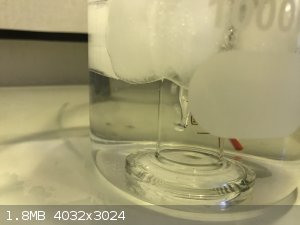 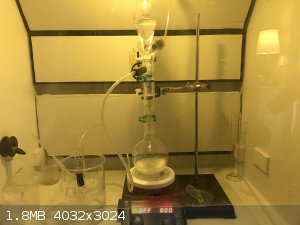
List of materials made by ScienceMadness.org users:
https://docs.google.com/spreadsheets/d/1nmJ8uq-h4IkXPxD5svnT...
--------------------------------
Elements Collected: H, Li, B, C, N, O, Mg, Al, Si, P, S, Fe, Ni, Cu, Zn, Ag, I, Au, Pb, Bi, Am
Last Acquired: B
Next: Na
-------------- |
|
|
j_sum1
Administrator
       
Posts: 6333
Registered: 4-10-2014
Location: At home
Member Is Offline
Mood: Most of the ducks are in a row
|
|
Distilled some otc isopropyl alcohol. Seemed to be already high purity. Head temp held rock steady and I discarded only a couple of mL of heads and
tails.
IPA is not quite the ubiquitous substance here that it is in the US. Nice to find such good quality.
|
|
|
mayko
International Hazard
    
Posts: 1218
Registered: 17-1-2013
Location: Carrboro, NC
Member Is Offline
Mood: anomalous (Euclid class)
|
|
I'm trying my first medium-scale brew & still.... 3 gallons of what the yeast pack promises is 20% alcohol are in the fridge and I'm setting up to
try distilling in the backyard tomorrow 
al-khemie is not a terrorist organization
"Chemicals, chemicals... I need chemicals!" - George Hayduke
"Wubbalubba dub-dub!" - Rick Sanchez
|
|
|
arkoma
Redneck Overlord
      
Posts: 1763
Registered: 3-2-2014
Location: On a Big Blue Marble hurtling through space
Member Is Offline
Mood: украї́нська
|
|
I find it quite fulfilling distilling small (gallon size batch of 55% EtOH) amounts of alcohol. And besides, I'm chipping in on the Sars-Co2
abatement. Hand sanitizer is mostly EtOH.
"We believe the knowledge and cultural heritage of mankind should be accessible to all people around the world, regardless of their wealth, social
status, nationality, citizenship, etc" z-lib
|
|
|
| Pages:
1
..
4
5
6
7
8
..
14 |